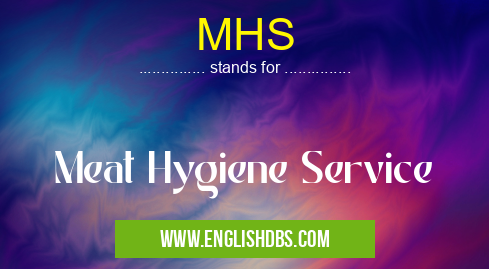What does MHS mean in VETERINARY
The Meat Hygiene Service (MHS) is an organisation that plays a crucial role in protecting the public from food borne illness. It ensures the safety of consumers through rigorous inspections and strict regulations on slaughterhouses, cutting plants and game handling establishments. The MHS works to prevent food poisoning outbreaks by making sure themeat supply is safe to eat by testing for harmful pathogens such as E. coli and salmonella, as well as making sure all meat products are labelled accurately so that customers can make informed decisions when they buy meat.

MHS meaning in Veterinary in Medical
MHS mostly used in an acronym Veterinary in Category Medical that means Meat Hygiene Service
Shorthand: MHS,
Full Form: Meat Hygiene Service
For more information of "Meat Hygiene Service", see the section below.
» Medical » Veterinary
Role of Meat Hygiene Service
The MHS is responsible for inspecting, investigating and controlling any potential issues related to the safety and quality of meat, as well as providing advice to other organisations about appropriate controls for food industry operations. This includes ensuring premises are clean and hygienic throughout the processing of meat, properly monitoring how animals are slaughtered and processed, checking packaging materials are suitable and inspecting premises after production has taken place to make sure all processes have been followed correctly. The MHS also works with local authorities, Trading Standards Officers and Environmental Health Officers to ensure that relevant legislation is followed when it comes to producing safe meat products.
Essential Questions and Answers on Meat Hygiene Service in "MEDICAL»VET"
What is the MHS?
The Meat Hygiene Service (MHS) is a government-funded inspectorate responsible for regulating the production and preparation of meat and poultry products in the UK. It carries out surveillance activities, sampling and inspection to ensure that meat production and distribution meet legal requirements.
What type of food is regulated by the MHS?
The MHS regulates all kinds of meat and poultry products such as whole muscle cuts, cooked hams, sausages, burgers, minced meat products, mechanically separated poultry products and egg products.
Who is responsible for ensuring compliance with MHS laws?
It is the responsibility of both food business operators (FBOs) and official veterinarians within the Food Standards Agency to ensure that laws and regulations related to food hygiene are met.
How often does the MHS inspect premises?
Inspections are conducted on an annual basis and are designed to verify compliance with food safety regulations. In addition, random unannounced inspections may be carried out depending on risk factors associated with particular premises or products.
Who enforces MHS inspection standards?
Enforcement decisions taken by local authorities are reviewed regularly by the Food Standards Agency's enforcement teams in order to ensure consistent treatment across all local authority areas.
How often does an FBO need to register with the MHS?
An FBO needs to register with the MHS every 12 months from its initial registration date in order to remain compliant with UK law.
Do I need a licence if I am operating in multiple locations?
Yes, each location must be registered separately with the relevant local authority under their own licence in order for your business activities to remain legal.
Final Words:
By fulfilling its duties, Meat Hygiene Services helps protect UK citizens from potential harm caused by eating contaminated or improperly prepared meat products. It ensures that businesses within the industry adhere to standards of hygiene which ensures consumers don't end up ill because of bad practices in production or packing plants. By carrying out detailed inspections with care and diligence, it also helps stop an outbreak of food poisoning at an early stage which can save many lives in a worst case scenario.
MHS also stands for: |
|
| All stands for MHS |
